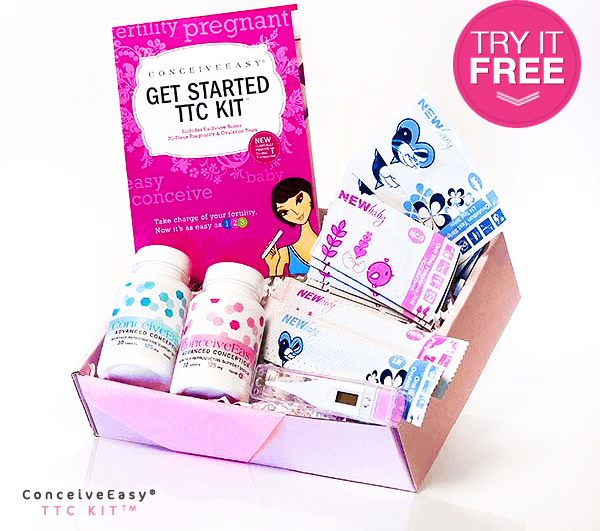![]() The information provided by our expert should not constitute a diagnosis of your condition. Always consult a medical practitioner or healthcare provider for a formal diagnosis. By making use of this content, you agree that ConceiveEasy and the expert assume no liability.
The information provided by our expert should not constitute a diagnosis of your condition. Always consult a medical practitioner or healthcare provider for a formal diagnosis. By making use of this content, you agree that ConceiveEasy and the expert assume no liability.
Okay, so there are a few simple things that can help you in conceiving even faster. And one of those would be the biggest factor of all — knowing your ovulation. Knowing your ovulation can help you in timing when to baby dance and that as well helps you in how to conceive even faster. Claim Your 20 Free Pregnancy Tests – Click Here

Now if you don’t know your ovulation dates, you can use ovulation predictor kits (OPKs), you can try an ovulation monitor, or you can do something as simple as an ovulation calculator.
Now, once you figure out when your fertile window is, this is the time you want to be baby dancing, slightly before, during your fertile window, and then of course, a little bit afterwards as well.
Remember, you only ovulate once every monthly cycle, and ovulation only occurs once. It is imperative that you know when you ovulate so you can properly time intercourse. If you miss your fertile window, you’ll assuredly miss that monthly cycle and move on to the next month.
If you haven’t pinpointed your exact day of ovulation, as a general rule of thumb, you can have intercourse every other day.
But keeping this up throughout the month may prove tiring, so timing intercourse to the day before, day of, and day after ovulation are big steps on the road to conceiving. Ovulation Predictor Kits are moderately priced, so they are a good choice for many women, however, the cost can add up over time if you use them for an extended period. There are many apps and online fertility trackers that you can also use to help you keep track of your fertile days in conjunction with other methods.
Try our Ovulation Calculator here!

Some other options you have to increase your odds of conception, even faster, would be charting. Now charting means, taking your temperature, checking your cervix, keeping notes on your cervical mucus. You can also write down your signs of ovulation pain, back pain, breast tenderness and any of those other things that may indicate ovulation is nearing.
(Read more in-depth about all your ovulation signs and how to check your cervix position and your cervical mucus.)
You can also have saliva testing, which you can pick up at your local drugstore as well as an at-home semen analysis test. Pretty cool, huh? Charting your basal body temperature every morning will prove to be a fantastic way to have a record of your own personal ovulation cycle, so you can begin to anticipate when you in particular will ovulate. Besides which, charting & temping is a free option, whereas taking OPKs or purchasing an ovulation monitor can be a bit more pricey. There are many online articles that can help you learn to chart your basal body temperature, and check your cervix.
These things can be a little hard to get the hang of at first, but over time, they will become second nature.

Supplements are another option for women. There are a number of both prescription & over the counter supplements on the market that can assist a woman’s body to boost their fertility levels. The most common prescribed fertility medication is Clomid, which helps stimulate ovulation. Over the counter supplements are also an option, to assist in regulating your hormones, helping stimulate ovulation, and helping lengthen your luteal phase – all necessary things that need to happen in order for you to achieve conception.
From brand name options like ConceiveEasy to over the counter vitamins or minerals like B6 or Vitex, check with your healthcare practitioner first to see which options are best for you. You can find for yourself what are the best fertility pills to get pregnant for you!
Many women have had success with fertility supplements, and the plus side of options like these are that they cut down on the number of doctor’s visits and the high cost of prescription fertility medications and treatments.
What have you got to lose?

An option that couples have together, would be your sexual position. Yes, sexual position. You have many options like doggy style, missionary, and side-by-side, but not all positions are created equal when you want to get pregnant.
The best position for couples trying to conceive would be either doggy-style or missionary with hips slightly elevated.
Both allow for deeper penetration, to ensure that the sperm is deposited as close to the egg as possible. However, be sure not to raise your hips too much because then you can bypass the cervix altogether. So be careful with that one.

But keep in mind that a little bit of gravity can’t hurt to help the sperm find its way to your egg. And also, after intercourse, it just makes good common sense to stay still laying down for 5-10 minutes, perhaps atop a small pillow or cushion, and allow the maximum amount of time for the sperm to find its mark – before getting up to go to the bathroom or walking around, etc.
Some women even swear by putting their legs up in the air for a good 15 minutes after ‘conception’ intercourse just to make sure! It certainly can’t hurt.


And then this last one is for the men specifically. Keep those sperm cool! No warm showers, no hot tubs, no hot laptops in your lap, no super snug underwear, no bike riding. Anything that is going to increase the warmth in the genital area will decrease your sperm count as well as their motility.
Furthermore, advise your partner to abstain from intercourse with you for 3-5 days before ovulation, to ensure enough sperm is built up to ensure maximum chance of conception.
So in this case, too much sex is too much sex. Let him build up his supply.

In this day & age, it goes without saying that making healthy lifestyle changes are paramount when you’re on the road to conception. Stop the smoking, stop the drinking, and pass on the latte grande. Many women overlook the caffeine angle, and yet many will find a simple reduction in caffeine intake proves a big boost to fertility.
There’s also a common misconception about how weight affects your fertility. When you’re trying to get pregnant, being the correct weight or a little overweight is better than being too skinny.
Studies have shown nearly two-thirds of women who were underweight struggled with infertility while being slightly overweight actually appears to help enhance your fertility. Yay!
If you are severely overweight, however, this will almost definitely impact fertility in a negative way, so women should do whatever they can to make sure that they are at an ideal weight before they try to conceive.

We all know that we should be paying attention to our diets and what goes into our body, but this is even more important if you are trying to conceive. Cutting down on “bad” foods, such as fast foods, snack foods, and foods loaded with sugar is a good first step when you are trying to get pregnant.
Instead, fill your diet with a variety of whole fruits and vegetables, lean meats and proteins, and whole grains. Look for foods that are as close to their “whole source” as possible, and the less processed, the better.

While we covered fertility supplements and vitamins previously, we want to take a minute to touch on prenatal vitamins. A good prenatal vitamin is essential for women who are trying to conceive. This is especially true if your daily diet is less than ideal. Taking a prenatal vitamin while you are trying to conceive can help to assure that your body is getting all of the vitamins and nutrients that it needs to maximize fertility.
Taking a prenatal vitamin with at least 400 mcg of folic acid while trying to conceive can also be incredibly imperative – not only in helping you conceive but in protecting your unborn baby. Another thing to remember: If you do happen to get pregnant and you are already taking a prenatal vitamin, you will be one step ahead of the game. Your unborn baby will already be protected from many birth defects and problems just because those nutrients and vitamins are already in your body.











Comments